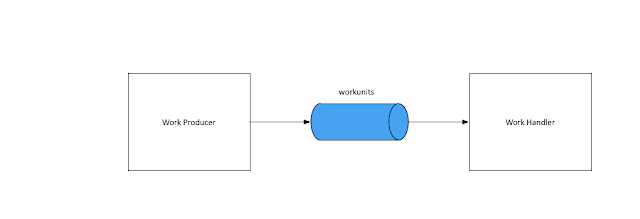Spring Kafka Producer/Consumer sample
Spring Kafka Producer/Consumer sample
My objective here is to show how Spring Kafka provides an abstraction to raw Kafka Producer and Consumer API's that is easy to use and is familiar to someone with a Spring background.
The sample scenario is a simple one, I have a system which produces a message and another which processes it
I have used a variation of the KafkaProducer constructor which takes in a custom Serializer to convert the domain object to a json representation.
Once an instance of KafkaProducer is available, it can be used for sending a message to the Kafka cluster, here I have used a synchronous version of the sender which waits for a response to be back.
Once an instance of KafkaConsumer is available a listener loop can be put in place which reads a batch of records, processes them and waits for more records to come through:
I have the implementation using Spring-kafka available in my github repo.
One thing to note is that whereas earlier I had implemented a custom Serializer/Deserializer to send a domain type as json and then to convert it back, Spring-Kafka provides Seralizer/Deserializer for json out of the box.
And using KafkaTemplate to send a message:
and the service which responds to messages read by the container:
Here all the complexities of setting up a listener loop like with the raw consumer is avoided and is nicely hidden by the listener container.
If you are interested in exploring further, the raw producer consumer sample is available here and the Spring Kafka one here
Sample scenario
The sample scenario is a simple one, I have a system which produces a message and another which processes it
Implementation using Raw Kafka Producer/Consumer API's
To start with I have used raw Kafka Producer and Consumer API's to implement this scenario. If you would rather look at the code, I have it available in my github repo here.Producer
The following sets up a KafkaProducer instance which is used for sending a message to a Kafka topic:|
1
2
|
KafkaProducer<String, WorkUnit> producer = new KafkaProducer<>(kafkaProps, stringKeySerializer(), workUnitJsonSerializer()); |
I have used a variation of the KafkaProducer constructor which takes in a custom Serializer to convert the domain object to a json representation.
Once an instance of KafkaProducer is available, it can be used for sending a message to the Kafka cluster, here I have used a synchronous version of the sender which waits for a response to be back.
|
1
2
3
4
|
ProducerRecord<String, WorkUnit> record = new ProducerRecord<>("workunits", workUnit.getId(), workUnit);RecordMetadata recordMetadata = this.workUnitProducer.send(record).get(); |
Consumer
On the Consumer side we create a KafkaConsumer with a variation of the constructor taking in a Deserializer which knows how to read a json message and translate that to the domain instance:|
1
2
|
KafkaConsumer<String, WorkUnit> consumer = new KafkaConsumer<>(props, stringKeyDeserializer(), workUnitJsonValueDeserializer()); |
Once an instance of KafkaConsumer is available a listener loop can be put in place which reads a batch of records, processes them and waits for more records to come through:
|
1
2
3
4
5
6
7
8
9
10
11
12
13
14
|
consumer.subscribe("workunits);try { while (true) { ConsumerRecords<String, WorkUnit> records = this.consumer.poll(100); for (ConsumerRecord<String, WorkUnit> record : records) { log.info("consuming from topic = {}, partition = {}, offset = {}, key = {}, value = {}", record.topic(), record.partition(), record.offset(), record.key(), record.value()); } }} finally { this.consumer.close();} |
Implementation using Spring Kafka
I have the implementation using Spring-kafka available in my github repo.
Producer
Spring-Kafka provides a KafkaTemplate class as a wrapper over the KafkaProducer to send messages to a Kafka topic:|
1
2
3
4
5
6
7
8
9
10
11
|
@Beanpublic ProducerFactory<String, WorkUnit> producerFactory() { return new DefaultKafkaProducerFactory<>(producerConfigs(), stringKeySerializer(), workUnitJsonSerializer());}@Beanpublic KafkaTemplate<String, WorkUnit> workUnitsKafkaTemplate() { KafkaTemplate<String, WorkUnit> kafkaTemplate = new KafkaTemplate<>(producerFactory()); kafkaTemplate.setDefaultTopic("workunits"); return kafkaTemplate;} |
One thing to note is that whereas earlier I had implemented a custom Serializer/Deserializer to send a domain type as json and then to convert it back, Spring-Kafka provides Seralizer/Deserializer for json out of the box.
And using KafkaTemplate to send a message:
|
1
2
3
4
5
6
7
|
SendResult<String, WorkUnit> sendResult = workUnitsKafkaTemplate.sendDefault(workUnit.getId(), workUnit).get();RecordMetadata recordMetadata = sendResult.getRecordMetadata();LOGGER.info("topic = {}, partition = {}, offset = {}, workUnit = {}", recordMetadata.topic(), recordMetadata.partition(), recordMetadata.offset(), workUnit); |
Consumer
The consumer part is implemented using a Listener pattern that should be familiar to anybody who has implemented listeners for RabbitMQ/ActiveMQ. Here is first the configuration to set-up a listener container:|
1
2
3
4
5
6
7
8
9
10
11
12
13
|
@Beanpublic ConcurrentKafkaListenerContainerFactory<String, WorkUnit> kafkaListenerContainerFactory() { ConcurrentKafkaListenerContainerFactory<String, WorkUnit> factory = new ConcurrentKafkaListenerContainerFactory<>(); factory.setConcurrency(1); factory.setConsumerFactory(consumerFactory()); return factory;}@Beanpublic ConsumerFactory<String, WorkUnit> consumerFactory() { return new DefaultKafkaConsumerFactory<>(consumerProps(), stringKeyDeserializer(), workUnitJsonValueDeserializer());} |
and the service which responds to messages read by the container:
|
1
2
3
4
5
6
7
8
9
10
11
12
|
@Servicepublic class WorkUnitsConsumer { private static final Logger log = LoggerFactory.getLogger(WorkUnitsConsumer.class); @KafkaListener(topics = "workunits") public void onReceiving(WorkUnit workUnit, @Header(KafkaHeaders.OFFSET) Integer offset, @Header(KafkaHeaders.RECEIVED_PARTITION_ID) int partition, @Header(KafkaHeaders.RECEIVED_TOPIC) String topic) { log.info("Processing topic = {}, partition = {}, offset = {}, workUnit = {}", topic, partition, offset, workUnit); }} |
Here all the complexities of setting up a listener loop like with the raw consumer is avoided and is nicely hidden by the listener container.
Conclusion
I have brushed over a lot of the internals of setting up batch sizes, variations in acknowledgement, different API signatures. My intention is just to demonstrate a common use case using the raw Kafka API's and show how Spring-Kafka wrapper simplifies it.If you are interested in exploring further, the raw producer consumer sample is available here and the Spring Kafka one here
小小菜鸟一枚





【推荐】国内首个AI IDE,深度理解中文开发场景,立即下载体验Trae
【推荐】编程新体验,更懂你的AI,立即体验豆包MarsCode编程助手
【推荐】抖音旗下AI助手豆包,你的智能百科全书,全免费不限次数
【推荐】轻量又高性能的 SSH 工具 IShell:AI 加持,快人一步
· Linux系列:如何用heaptrack跟踪.NET程序的非托管内存泄露
· 开发者必知的日志记录最佳实践
· SQL Server 2025 AI相关能力初探
· Linux系列:如何用 C#调用 C方法造成内存泄露
· AI与.NET技术实操系列(二):开始使用ML.NET
· 无需6万激活码!GitHub神秘组织3小时极速复刻Manus,手把手教你使用OpenManus搭建本
· C#/.NET/.NET Core优秀项目和框架2025年2月简报
· Manus爆火,是硬核还是营销?
· 终于写完轮子一部分:tcp代理 了,记录一下
· 【杭电多校比赛记录】2025“钉耙编程”中国大学生算法设计春季联赛(1)